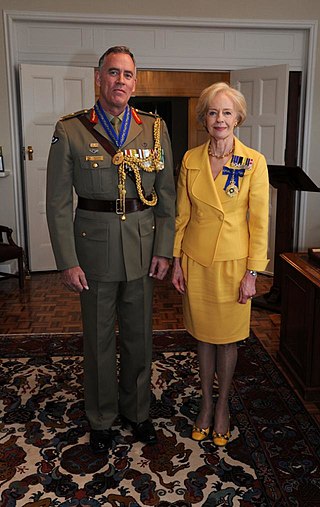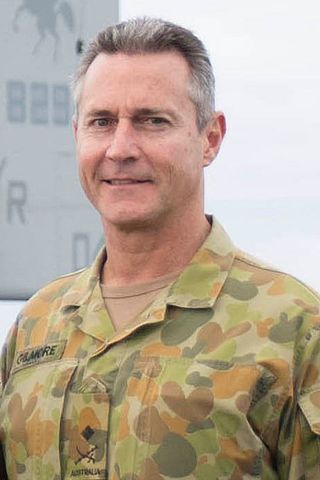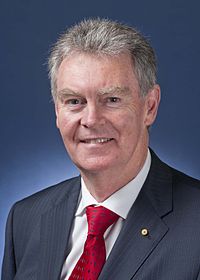
The Australian Defence Force (ADF) is the military organisation responsible for the defence of the Commonwealth of Australia and its national interests. It consists of three branches: the Royal Australian Navy (RAN), Australian Army and the Royal Australian Air Force (RAAF). The ADF has a strength of just over 89,000 personnel and is supported by the Department of Defence alongside other civilian entities.

A commander-in-chief or supreme commander is the person who exercises supreme command and control over an armed force or a military branch. As a technical term, it refers to military competencies that reside in a country's executive leadership, a head of state, head of government, or other designated government official.
The Defence Strategic Policy and Intelligence Group (SP&I) of the Australian Government Department of Defence is responsible for defence diplomacy, strategic policy, international security, and military intelligence co-ordination and advice to the Prime Minister of Australia, Minister for Defence, Secretary of the Department of Defence, and Chief of the Defence Force. The Defence Strategic Policy and Intelligence Group is led by the Deputy Secretary for Strategic Policy and Intelligence and comprises three policy divisions and two intelligence agencies.

The Chief of the Defence Force (CDF) is the highest-ranking and most senior military officer in the Australian Defence Force (ADF) and is the principal military advisor to the National Security Committee and the Minister for Defence. The current Chief of the Defence Force is Admiral David Johnston, who took office on 10 July 2024.
Defence Australia is a department of the Australian Government that is responsible for administering the Australian Defence Force (ADF) and its related entities, and is charged with the defence of Australia and its national interests. Along with the ADF, it forms part of the larger Australian Defence Organisation (ADO) and is accountable to the Parliament of Australia, on behalf of the Australian people, for the efficiency and effectiveness with which it carries out government policy.

Lieutenant General Kenneth James Gillespie is a retired senior officer in the Australian Army. Gillespie served as Vice Chief of the Defence Force from 2005 until 2008, then Chief of Army from 2008 until his retirement in June 2011.

Major General Timothy Joseph McOwan, is a retired senior officer of the Australian Army. He served as Special Operations Commander Australia from February 2008 until January 2011, and the Australian Defence Attaché and Head Australian Defence Staff in Washington, D.C. He retired from the army in 2014.
The Australian Defence Organisation (ADO) is composed of the armed forces of the Commonwealth of Australia, the Australian Defence Force (ADF), and the Australian Public Service government department, the Department of Defence which is composed of a range of civilian support organisations.

Nicholas Peter Warner, is an Australian diplomat, intelligence official, public servant, and the Director-General of the Office of National Intelligence since 20 December 2018.
The Australian Defence Organisation (ADO) is composed of the armed forces of the Commonwealth of Australia, the Australian Defence Force (ADF), and the Australian Public Service government department, the Department of Defence which is composed of a range of civilian support organisations.

Major General Peter Warwick "Gus" Gilmore, is a retired senior officer of the Australian Army. A graduate of the Royal Military College, Duntroon, he was commissioned into the Royal Australian Infantry Corps in 1983 and spent much of his career in special forces. He commanded the Special Air Service Regiment (2001–02), led the first contingent of the Australian Special Operations Task Group in Afghanistan (2001–02), was responsible for the Coalition Advisory Support Team in Iraq (2005–06), and commanded International Security Assistance Force Special Operations Forces (2009–10). Following promotion to major general he held a succession of senior appointments, including Special Operations Commander Australia (2011–13), Deputy Chief of Army (2013–15), and Commander Forces Command (2015–16). His final appointment was as Head Military Strategic Commitments Division from 2016 to 2019.

Major General Paul Bruce Symon, is a retired senior Australian Army officer and public servant. He served as Deputy Chief of Army from 2009 to 2011, Director of the Defence Intelligence Organisation from 2011 to 2014 and, following his retirement from the army, was Director-General of the Australian Secret Intelligence Service from 18 December 2017 to 20 February 2023.

General Angus John Campbell, is a retired senior officer in the Australian Army, who served as the Chief of the Defence Force from 6 July 2018 until 10 July 2024. He was previously posted as Commander Operation Sovereign Borders from September 2013 until he was appointed Chief of Army in May 2015.

Gregory Laurence Moriarty, is a senior Australian public servant and diplomat, and the current Secretary of the Department of Defence since 4 September 2017. He was previously the Chief of Staff to Prime Minister Malcolm Turnbull. Moriarty has been Australian Ambassador to Iran from 2005 to 2008, Australian Ambassador to Indonesia from 2010 to 2014, the inaugural Commonwealth Counter-Terrorism Coordinator from 2015 to 2016, and the International and National Security Adviser to the Prime Minister.

Mark William Christopher Higgie is a former Australian diplomat, political advisor, and intelligence analyst. Higgie is now a regular columnist on European affairs, mainly in the Australian edition of The Spectator. He was the Australian Ambassador to the European Union and NATO, Belgium, and Luxembourg between 2014 and 2017. He previously served as international advisor to the Hon Tony Abbott MP, both when Abbott was Leader of the Opposition (2010–2013) and when he was Prime Minister (2013–2014).

General Gwyn Jenkins, is a senior Royal Marines officer, who served as Vice-Chief of the Defence Staff from August 2022 to June 2024. He was concurrently appointed Commandant General Royal Marines in November 2022.

Lieutenant General Simon Andrew Stuart, is a senior officer of the Australian Army who has served as the Chief of Army since July 2022. He was commissioned into the Royal Australian Infantry Corps from the Royal Military College, Duntroon in 1990. He has commanded the 8th/9th Battalion, Royal Australian Regiment (2008–10), Joint Task Force 631 (2010) and Combined Team Uruzgan (2012–13), and deployed to East Timor as part of Operations Warden, Tanager and Astute and to Afghanistan and the Sinai Peninsula. He was Force Commander, Multinational Force and Observers in the Sinai from 2017 to 2019, and Head Land Capability from 2020 to 2022. He succeeded Lieutenant General Rick Burr as Chief of Army on 2 July 2022.
Lieutenant General Gavan John Reynolds, is a retired senior officer in the Australian Army who is the Commissioner of the Australian Border Force since 2024. He joined the army via the Royal Military College, Duntroon in 1985 and has spent much of his career in military intelligence. He has commanded the 1st Intelligence Battalion (2004–05) and the 6th Combat Support Brigade (2013–15), and deployed on operations to the Persian Gulf, Lebanon and Syria, Iraq, and Afghanistan. He served as Head Military Strategic Plans from 2019 to 2020, before being appointed as the inaugural Chief of Defence Intelligence in July 2020.

Air Marshal Robert Timothy Chipman, is a senior officer in the Royal Australian Air Force (RAAF). He joined the RAAF as an aeronautical engineer in 1989 and gained his pilot's wings in 1994. He has commanded No. 75 Squadron RAAF (2006–09), the Air and Space Operations Centre (2010–12), No. 81 Wing RAAF (2013–14) and Air Task Unit 630.1 (2014), and deployed to the Middle East on Operations Slipper and Okra. He served as the Australian Military Representative to NATO and the European Union from 2019 to 2021, Head Military Strategic Commitments from 2021 to 2022 and Chief of Air Force from 2022 to 2024. Chipman assumed his current appointment as the Vice Chief of the Defence Force on 9 July 2024.















